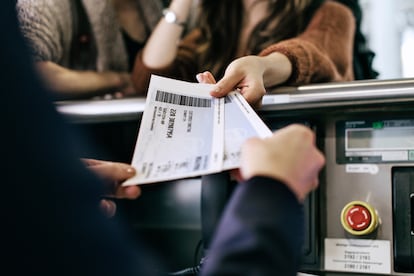SSSS: Four letters you never want to see on your boarding pass
This code means that the passenger has been chosen for additional checks and a more thorough screening

SSSS. Four capital S’s in a row. Infrequent travelers may be surprised if they see those letters on their boarding pass. That code, which stands for Secondary Security Screening Selection, is used by the Transportation Security Administration (TSA) to carry out a more thorough screening of a passenger, an additional security measure implemented after the 9/11 attacks. This inspection can range from asking a person to remove their clothes to performing a full body search; this, even if they meet the necessary requirements to travel to or within the U.S.
There are many different reasons why a traveler might end up with an SSSS on their boarding pass. Although the TSA insists that those who receive this code are randomly selected, many report having been subjected to this screening several times.
According to lifehacker.com, purchasing one-way tickets, paying in cash, visiting or laying over in a country that is considered “high risk” by the Department of State or frequent travel to unusual destinations can land passengers on the TSA’s secret list, with the increasingly thorough screenings that come with it. If your name is similar to that of someone that has been blacklisted by the TSA, you could also end up in the list.
Second international trip in a row where I have the dreaded SSSS on my boarding pass. I feel like they're picking on me. pic.twitter.com/PmNd4YiDGk
— Kelly Vaughn (@kvlly) February 23, 2020
Other secret codes
In addition to the seat number, boarding gate, passenger name, flight number and airline, there are other codes on your boarding pass, such as the record locator (a combination of five or six digits and letters also known as reservation code or passenger name reference) or the SSR (Special Services Request) code, for children traveling unaccompanied, people with mobility problems, special diets and more. Within this category, there are other, even more complicated ones: SRVGML, for example, refers to a vegan meal request, while SRWCHC has to do with a wheelchair request.
The S/O code applies to stopovers; that is, those who stop for more than 24 hours in the middle of a long-haul flight, something that allows you to visit two destinations in the same trip, taking advantage of the large hubs. Some airlines have specialized in this type of connection with offers that include, without the need for a visa, free stays or significant discounts, transfers and even à la carte excursions.
Among these codes there are also individual letters that indicate the class in which the passenger is flying and the discount applied to the fare (Y, H, M and B, for example, indicate economy class tickets, while J, I, C and D are for business class). Even if paper tickets have gradually disappeared, these codes remain, included in the QR code of your mobile boarding pass.
Other terms used by airlines and their crews
Circle Trip. A round-trip ticket with different rates for each flight, or with one or more intermediate stops.
Codeshare. An agreement signed by two airlines, generally from the same alliance, to jointly operate a certain route.
Combinability. The art of juggling different airfares to visit more places for less.
City Pair Availability. Availability of flights between two cities.
Direct Flight. The one that goes from airport A to airport B with the same flight code and without changing planes. It may have one or more stops. Not to be confused with “non-stop flight,” which is traveling between two airports without intermediate stops.
Excursion. A type of reduced fare that applies to scheduled return flights, with a minimum and maximum number of days between the departure and the return date, usually between one week and six months.
Midweek. A special rate for midweek flights.
No Frills. Flights in which costs are reduced by eliminating services.
Open Jaws. Flights with different arrival and return airports, in which part of the journey is made by land or by sea or by another flight with a different reservation. The formula allows you to enjoy similar prices to those of closed round-trip tickets and to travel between two distant points without having to return to the arrival airport.
Open Return. A flight that leaves the return date open. It generally requires confirmation of the return flight (if you wait until the last minute you may end up on the waiting list).
Overbooking. An annoying, albeit legal, practice. It is when an airline sells more tickets than they have seats, to make sure that the plane will be full at take off.
Pex and Apex (Advance Purchase Excursion). A reduced fare that requires buying the ticket in advance, with no changes or refunds allowed.
Prepaid Ticket Advice. When the person who buys the ticket is someone other than the passenger. An increasingly less common option since electronic tickets were introduced.
Rerouting. Any voluntary change in the route, date, time, class or destination of a flight. It usually carries some type of penalty, especially in the cheapest rates.
Saturday rule and Sunday rule. Rates that require spending Saturday or Sunday night at the destination; this is intended to avoid the use of this reduced rate on business trips, limiting it to tourist uses.
Standby. A formula that allows travelers with a ticket to wait for a seat to become free in the minutes before boarding another flight on the same route.
Transfer. A connection between two flights, generally within the same terminal and without the need to collect luggage.
Upgrade. A change to a better class.
Sign up for our weekly newsletter to get more English-language news coverage from EL PAÍS USA Edition
Tu suscripción se está usando en otro dispositivo
¿Quieres añadir otro usuario a tu suscripción?
Si continúas leyendo en este dispositivo, no se podrá leer en el otro.
FlechaTu suscripción se está usando en otro dispositivo y solo puedes acceder a EL PAÍS desde un dispositivo a la vez.
Si quieres compartir tu cuenta, cambia tu suscripción a la modalidad Premium, así podrás añadir otro usuario. Cada uno accederá con su propia cuenta de email, lo que os permitirá personalizar vuestra experiencia en EL PAÍS.
¿Tienes una suscripción de empresa? Accede aquí para contratar más cuentas.
En el caso de no saber quién está usando tu cuenta, te recomendamos cambiar tu contraseña aquí.
Si decides continuar compartiendo tu cuenta, este mensaje se mostrará en tu dispositivo y en el de la otra persona que está usando tu cuenta de forma indefinida, afectando a tu experiencia de lectura. Puedes consultar aquí los términos y condiciones de la suscripción digital.









































